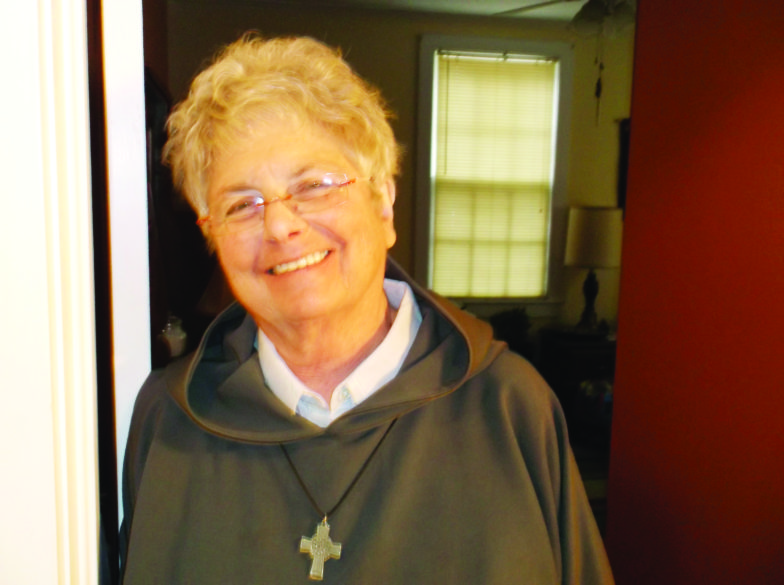From the hermitage
By sister alies therese
Perhaps you’ve read a couple of the wonderful books by L. Van derPost of South Africa? Besides drawing you into a tender story and then challenging you with a hard truth, he writes and shares with us an exploration of his life. Often writers (both fiction and non-fiction) take us on a trip of some sort that either ‘tells the truth’ or ‘implies a truth within a fictionalized setting.’ In either case one might discover much of the richness of the writer’s testing of his/her own life as well as the readers. The writer may offer several different threads that might, or might not, come together at some point showing some continuity and often great patience, especially when things ‘go wrong.’

I wonder if we’re in a time of rummaging around in our own lives, the church’s (especially) and our cultures to find those threads that may, or may not, come together? At what level is there no anguish? Huge fires/climate change, pandemic, hurricanes, interpersonal strife, loneliness, international disregard, where indeed is the thread that draws us together? These are a part of deficit culture … what brings us to see a culture of beneficence?
Back in 1984 Michael Ignatieff, in The Needs of Strangers, reflected this: “If we deceive ourselves about what we need, we are likely to be deceived about what strangers need. There are few presumptions in human relations more dangerous than the idea that one knows what another human being needs better than they do themselves … if we need love, it is for reasons that go beyond the happiness it brings; it is for the connection, the rootedness, it gives us with others.”
Notice our strange mixtures. Consider a blood family of three children and parents, for example, and wonder sometimes if they are connected! Maybe it will be facial, or the sound of voice, or a certain talent, or hair color. Some things will indicate that they are ‘related.’ What are the things in God’s family that show, though in very different ways, ‘we’re all related?’ What are those ‘six-degrees’ of separation that bond us? How do we put together those many strands and threads and celebrate?
Within the human community, and indeed within the community of believers, there are as many differences as similarities. Bottom line stretches to ‘human’ (all bleeding red blood), ‘we all have certain needs’ and we are on a path that calls us forward from ‘birth to death.’ Beyond that almost everything else, social status, color, attitudes, beliefs, fears, competences and the lot are as individual as we can imagine. We are strangers as often to ourselves as to others.
One stereotypical image of a beggar is perhaps a homeless person blinded by disconnection from self, family, housing, medical care and food. We have a persistent beggar within, the unwillingness to be born/change things by refusing to allow the Spirit to prompt growth. We can spend inordinate amounts of time telling others what they need, what they should do/not do, what they ought to understand. Rather we might remain silent and allow them to discover their own threads. Or we might ask questions that will help reveal the beggars within us.
We might agree that racism, not telling the truth, or the –ism you pick are evil, sinful, horrid. We might agree but what to do about it needs input from the sufferers outlining some change. Opinions and political implications and others have dictated what to do for many years and have been relatively unsuccessful. Where is my heart stuck? What does my heart have to contribute?
Ignatieff reminds us: “the theory of human needs is a particular kind of language of the human good. To define human nature in terms of needs is to define what we are in terms of what we lack, to insist on the distinctive emptiness and incompleteness of humans as a species.” To know our ‘beggars’ is to discover not only what we need, but what we have to share. To define others (the poor, the wayward, the unborn, the prisoner, the weary, the old) by what they lack is a deficit culture and we never see beyond as Jesus sees.
Van derPost in his 1973 The Seed & Sower, points this out: “… I did not understand the sabotage in the invisible dimension of my being… There is a strange, persistent beggar at a narrow door asking to be born; asking again and again, for admission at the gateway of our lives.”
If we want to be born, or allow those threads to come together within, we might encourage ourselves to act, to build the Beloved Community. Perhaps that’s the kind of love that makes a difference, that ‘good trouble’, the kind that ‘relates’ us? Might even be the beginning of real change?
BLESSINGS.
(Sister alies therese is a vowed Catholic solitary who lives an eremitical life. Her days are formed around prayer, art and writing. She is author of six books of spiritual fiction and is a weekly columnist. She lives and writes in Mississippi.)
